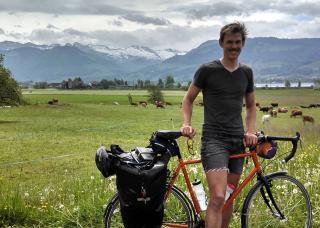Alex Bigazzi’s “Silver Bullet”


Biking to work every day – rain or shine – isn’t just Alex Bigazzi’s commute to his job at UBC’s Vancouver campus. For Alex, active transportation has become a lifestyle and a research topic he is deeply passionate about.
It’s also part of what led him to join UBC as Assistant Professor in 2015.
When a new joint appointment came up with the Department of Civil Engineering and the School of Community, Alex jumped at the chance to join an academic community with endless opportunities for collaboration in his research on urban transportation.
“Transportation is at an intersection of natural and social sciences, and requires broad thinking to understand complex problems,” says Alex. “I love that it intersects with so many other fields, from social justice to atmospheric science.”
Transportation is at an intersection of natural and social sciences, and requires broad thinking to understand complex problems.
Alex Bigazzi
Alex’s recent research illustrates his multi-disciplinary approach, and resulted in in a model that shows ideal speeds cyclists and pedestrians should travel on city roads to minimize their inhalation of emissions while still getting the health benefits of exercise.
This work is informing transportation engineering and planning in cities around North America, and is helping people make healthy choices for getting around.
“The research process is especially fun because I get to do it in a field I love,” Alex explains.
He attributes his love of cycling in part with growing up in the car-dependant suburbs of Georgia. Alex remembers having to drive everywhere, and dreading being stuck in traffic.
Alex recalls: “I always kind of hated being in the car.” When he moved to Miami as an undergraduate student, he discovered cycling and eventually tried a bike tour of the Florida Keys. He was instantly hooked.
“That was the first time I remember being truly excited about cycling,” he says. “It was so fun and beautiful.”
After completing a Bachelor of Music, Alex decided to move to a city where he could ditch his car for good, and chose Portland, Oregon. At the time, he also switched his major to Civil and Environmental Engineering so that he could pursue his interests in urban transportation.
That was ten years ago, and he has been biking, walking and running just about everywhere he goes ever since.
What fascinates Alex most about his field is that it combines science and human behaviour.
“I’m interested in trying to help steer those systems in a better direction, and inspired by the pace of change in the field,” he adds.
Looking ahead, Alex aims to forge new connections in the coming years with faculty and students in public health, mechanical engineering, business and other units across UBC.
He and his research team are working on ways to successfully transition North American transport systems to low-impact forms. Alex hopes that by increasing public understanding about active travellers, society will become more open to fully accommodating cyclists and pedestrians on our roadway facilities.
Why does he feel this is so important? Alex calls walking and biking a “silver bullet:”
“It’s healthy, it’s good for the environment, it’s good for the city and it’s efficient,” he says. “It’s not often we find something that benefits us in so many ways with almost no drawbacks.”
It’s not often we find something that benefits us in so many ways with almost no drawbacks.
Alex Bigazzi
Find the latest news, updates, events, and useful dates from across UBC, curated for faculty and staff by Internal Communications.
Access a library of resources from multiple UBC websites, all in one place.